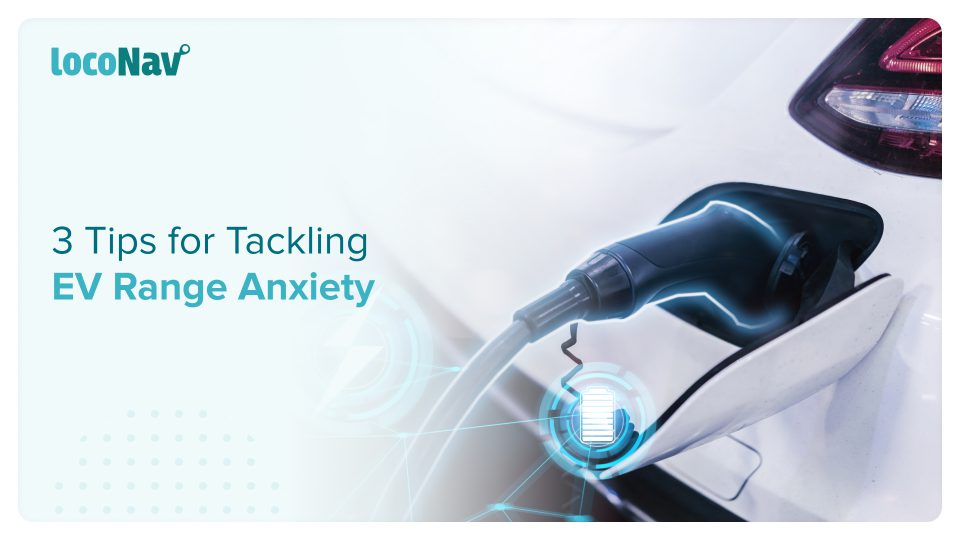

Electric vehicle (EV) range anxiety is a significant roadblock to EV adoption. Prospective EV customers are concerned about running out of battery power and becoming stranded. On the other hand, most EV drivers recognize that, while range anxiety is real, running out of charge is unlikely to happen to them.
Whether you own an EV or are considering purchasing one, don’t let range anxiety keep you from enjoying an electric vehicle. The advantages of owning an electric vehicle are too tremendous to pass up because of unfounded fear. Let’s look at what EV range anxiety is and why you shouldn’t be concerned.
Manage your fleet efficiently with LocoNav’s Fleet Management Solutions!
What is Electric Vehicles Range Anxiety?
EV Range Anxiety is the fear that the EV will not have enough charge to fulfill its task and is still seen as one of the most significant impediments stopping fleets from turning electric.
Early electric vehicle models had a bad reputation for having a short range between charges. Despite manufacturers’ claims to the contrary, drivers frequently discovered that they couldn’t get much mileage out of a fully charged battery. This harmed the reputation of the electric vehicle market, and it continues to do so to some extent.
Obviously, no fleet manager wants to be concerned about rescuing stranded personnel and corporate vehicles, which entails lost output and recovery costs. You also don’t want to deal with your employees’ concerns that the car you supply will be unstable and inconsistent. Managing cars that are utilized several times throughout the day or on difficult routes can raise additional difficulties.
Tips To Manage EV Range Anxiety
Follow these tips to get more range from your EVs if you’re electrifying your fleet:
- Match The Vehicle To The Task
Evaluate the conditions that each vehicle and duty cycle will face. Is the terrain difficult? Is it prone to extreme cold or hot temperatures? Factors like these can put extra demand on batteries, reducing the real-world range they can achieve.
Consider the maximum daily mileage that the car will require. What is the duty location, and will the car be close to appropriate charging infrastructure, whether private or public?
- Optimum Vehicle Maintenance
A thorough preventative maintenance regimen, as with all vehicles, aids in lowering fleet running expenses. Maintaining proper tyre pressure, for example, can help EVs get the most mileage out of each charge. Tire pressure can vary by one PSI for every ten degrees Fahrenheit change in air temperature, so schedule tyre pressure checks as the seasons change.
- Driver Training
Your drivers are critical to getting the maximum range out of your EVs. A smooth driving style, which includes driving at reasonable speeds and avoiding sudden speeding or braking, contributes to improved energy efficiency and increased range. Educating your drivers to preheat or precool the car while it is still plugged in saves energy that may otherwise be utilized for driving.
Finally, encourage people to use the vehicle’s regenerative braking technology. By using the vehicle’s maximum regenerative setting and utilizing this energy-recovery feature when coming to a stop, the driver will transfer the most power back to the vehicle’s batteries when decelerating, hence improving the vehicle’s range and battling electric car anxiety.
Factors Triggering EV Range Anxiety Amongst Buyers
EV Charging Anxiety is very real. It is the major roadblock to EV adoption. Some factors that trigger EV Range Anxiety are:
- Charging Infrastructure
While EV chargers are readily being installed in various areas, there are still large stretches where you cannot find an electric vehicle charging port. Also, considering that multiple OEM partners are in the game of producing electric vehicles, even if you find a charger in a public place, it may not be compatible with your vehicle. This will naturally lead to a feeling of being left stranded should your vehicle run out of battery.
- Charging Time
Depending on the level of charger you are using, an electric vehicle can take anywhere between 30 mins to 18 hours to be fully charged. In case you run out of battery, it may not always be feasible for you to wait several hours for your vehicle to charge.
- Road Recovery
Most developing and developed countries are equipped with recovering on-road vehicles should they break down or run out of fuel. The same is sadly not very true for electric vehicles. While fuel can be brought to almost any location for recovering a stranded vehicle, an electric vehicle would have to be brought to a charging station. This can turn out to be both difficult and expensive.
- Power Cuts
Most developing countries still face the problem of frequent power outages. The primary weapon in an EV owner’s arsenal is charging their vehicle overnight at their home. What if there is a power outage though? This among other things is impeding the adoption of electric vehicles and triggering EV Range Anxiety.
Good EV Charging Habits
- There’s no need to drain an EV to 0% before charging, as you would with a fuel vehicle. Except when you need to rely on your vehicle’s entire driving range, try to stay between 20% and 80% capacity.
- When not using your EV for a week or more, leave the battery roughly halfway charged.
- Cold weather can cause an EV to lose up to 30% of its driving range throughout the winter. Staying plugged in keeps the battery warm and increases range.
- If your batteries are about to die, using a quick charger is a huge time saver. However, it injects a large amount of current into the batteries in a short period of time, which stresses and depletes your EV battery faster.
- The most common threat occurs when exposed to extreme heat when parking is disconnected. An automated temperature management system placed in your electric vehicle may drain your batteries unnecessarily in order to maintain optimal performance.
FAQ
How To Maximize EV Range?
Here are 5 easy tips to maximize your EV Range:
- Avoid harsh driving
- Avoid over-speeding and stay within 60mph
- Maximize regenerative braking
- Follow good charging practices
- Avoid extreme heating or cooling
What Affects EV Range?
A variety of other factors influence vehicle range, including battery capacity, vehicle size and aerodynamics, battery heating efficiency, and ambient temperature. As a result, it is quite typical for an electric vehicle to travel further on a single charge on a warm summer day than on a severely cold winter day.
